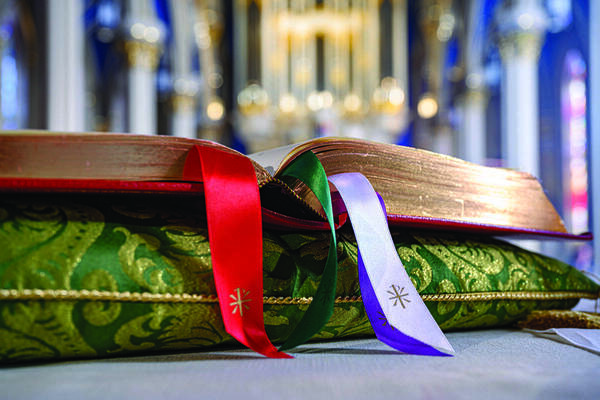Notre Dame and the Synod on Synodality
In response to Pope Francis’s call for a Synod on Synodality, Notre Dame’s Office of Campus Ministry hosted a series of listening sessions to understand the voices and perspectives of young people in the university setting. While synodality is often used by bishops as an approach to listen and discern an issue, this two-year worldwide endeavor to gather, listen, and evangelize is unique. It has been divided into phases: diocesan, episcopal, continental, and universal. Notre Dame’s synod took place in the diocesan phase, which focused on listening.
“As Pope Francis has called on all leaders within the Church to listen authentically to the experiences, worries, joys, and hopes of the People of God, we at Notre Dame were inspired to participate in this important moment in the Church,” says Rev. Peter McCormick, C.S.C., the assistant vice president for Campus Ministry. “As a preeminent institution of Catholic higher education, we feel that this will not only be an important way that the University can be of service to the Church—by helping to share the voices and experiences of young people —but also an opportunity to better understand the faith experiences and spiritual needs of our students.”
In the spring of 2022, students were individually invited to participate in listening sessions focused on four questions: How do you tend to

your spiritual needs? Where do you find community? What do you want the Church to know about you? What do you want Notre Dame to know about you?
Faculty and staff facilitators were asked to lead the listening sessions and submit summaries of the conversations. From those summaries, prevalent themes were extracted. Among the findings were positive notes about Notre Dame’s sense of community and the prevalence of places, rituals, and materials available to assist students in practicing their faith. However, students noted a lack of trust and inclusion, especially as it applied to women and LGBTQ, within the greater Church and at the University. Students lamented a growing polarization in the Church and on campus and judged the integration of the Church’s social teachings – especially through opportunities for direct service to the poor – with their experiences of spirituality to be insufficient. Many students expressed a desire to practice their faith in ways that are congruent with their cultures and backgrounds. While some students who desire more traditional expressions of their faith desire more such opportunities, others noted uncertainty about how those with less traditional religious practices fit into the faith life of the University.
Father McCormick says, “Students want to see how faith makes a difference in their lives. They want the Church to practice what it preaches and, in doing so, willingly stand against power, prestige, and privilege. Anything short of this standard feels inauthentic and not worth any real pursuit.”
After the sessions, a final synod report was offered, summarizing the process and results, but Father McCormick notes that the work is not yet over. Campus Ministry, the University at large, and the greater Catholic community will now reflect on how their engagement and ministry can and should shift in response to these valuable perspectives.
“Notre Dame Campus Ministry must dedicate itself to a ministerial approach that is, first and foremost, relational. As Jesus ministered, so must we: knowing people by name, loving them in their deepest moments of doubt, and witnessing to the power of the resurrection,” Father McCormick says. “Certainly, some programs will help amplify this message of hope, but the primary role of Campus Ministry today is deeply rooted in an in-person encounter.”